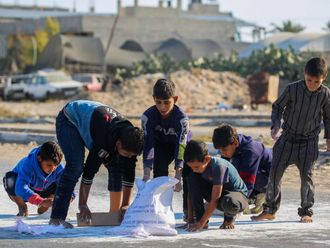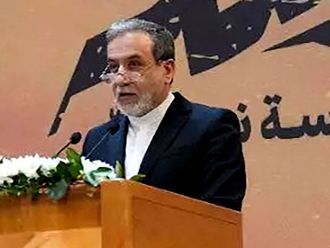Occupied Jerusalem: Israel is quietly stepping up its military cooperation with Egypt as both countries confront security threats from jihadist groups in the Sinai region, security officials and analysts said on Monday.
This came as suspected Islamist militants executed 25 Egyptian police conscripts in the north of the peninsula, near Egypt’s Rafah border crossing with the Gaza Strip, the worst attack of its kind in recent memory.
Monday’s incident came six days after Sinai-based jihadists claimed responsibility for firing a Grad rocket, which was intercepted by Israel’s Iron Dome missile defence system, at the southern Israeli resort town of Eilat.
“It seems that the Egyptian army is more willing to cooperate with the Israeli army over the last few weeks due to the collapse of the old regime,” said Ephraim Kam, a senior researcher with the Institute for National Security Studies in Tel Aviv. “Since then, the Egyptian army has been conducting more intensive operations in the Sinai.”
Egypt made a rare public acknowledgement of Israel’s role in enforcing regional security on Monday when Mustafa Hijazi, an adviser to Egypt’s interim president Adli Mansour, told Russia Al Yawm, the Arabic-language Russian TV station, that it was “natural” for Israel to monitor events in a neighbouring country” against what he called “spillover”.
“It’s in the entire region’s interest,” he said.
Egypt and Israel, which signed a peace agreement in 1979, have long consulted on military issues, even during the government of deposed president Mohammad Mursi. Both countries saw common cause in fighting militants in the restive Sinai, which is about three times the size of Israel, the main transit point for Egyptian natural gas, and abuts Egyptian, Israeli and Jordanian tourist resorts on the Red Sea.
However, Israeli officials are privately welcoming the fall of Egypt’s Islamist government at a time when Israel’s regional security position has also been strengthened by the war against Bashar Al Assad’s government in Syria and the weakening of its ally Hizbollah. Egypt’s coup has also politically isolated Hamas, the anti-Israel militant group, by depriving it of its biggest regional ally.
Government officials are remaining silent about the regime change for fear that any public remarks could have unintended consequences. “We need to sit on the sidelines and let the Egyptians do what they want and stay out of it,” one official said on Monday. “To be the responsible adult in the Middle East is not an easy thing.”
Prime Minister Benjamin Netanyahu’s office also distanced itself from remarks made by anonymous Israeli officials to the New York Times and the Jerusalem Post asserting that Israeli diplomats would press other countries to support Egypt’s new military-supported government.
Israel was suspicious of Mursi’s commitment to the peace treaty, with some officials fearing his government might abrogate the agreement once it strengthened its political power base and Egypt’s economy. The peace treaty is widely understood to be one of the main reasons the US is keeping its military aid to Egypt intact, even as the European Union considers suspending aid.
Since Mursi’s overthrow, the Egyptian military has increased its operations in the Sinai, where the army has also closed down smuggling tunnels linking the peninsula to the Gaza Strip, ruled by the Islamist group Hamas. Israel has been working more closely with the Egyptian military than previously, analysts said.
“There is cooperation, at least on the practical level, between the Egyptian military and their Israeli counterparts in terms of sharing intelligence and allowing an Egyptian presence in the Sinai Peninsula that is much larger than what was written in the peace agreement,” said Aviv Oreg, a reservist in Israeli military intelligence, where he formerly headed the unit’s Al Qaida and global jihad desk. An Israel Defence Forces spokesman declined to comment.
A disputed incident earlier this month in which four members of a Sinai-based Islamist group were killed points to some of the biggest military operations in the peninsula since the Camp David agreement. The group Ansar Bayt Al Maqdis said its members were killed by an Israeli drone strike, but the IDF did not comment on the attack, and Egypt’s army said it carried it out itself.
At the same time, Israel is vigilant about any increased risk to Eilat, whose tourist industry would be vulnerable in the event of a successful rocket attack from the Sinai.
Israeli authorities briefly closed down Eilat’s airport two weeks ago for several hours, without giving a reason. Eilat was hit by two rockets fired from the Sinai in April.












